|
|
|
Sort Order |
|
|
|
Items / Page
|
|
|
|
|
|
|
| Srl | Item |
| 1 |
ID:
116054
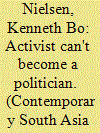

|
|
|
|
|
| Publication |
2012.
|
| Summary/Abstract |
This article explores the ambiguity inherent in the relationship between social activism and politics in West Bengal. I use a detailed account of the career of singer-activist turned politician Kabir Suman to examine the activist's view of himself and of politics, as well of how the porous boundary between activism and politics is both blurred and crossable. The fact that activists possess a kind of political capital useful within the framework of a political party may facilitate their entry into electoral politics. Yet as this article demonstrates, the activist may sometimes only be able to retain his activist credentials by sacrificing his political career. In addition, this article seeks to conceptualise the social activist as a particular type of political figure. I do so by locating the study of Kabir Suman within an emerging body of literature on political leadership in India. I argue that while the case of Kabir Suman may not be paradigmatic, his 'activist' style of leadership challenges certain contemporary classifications of political leadership in India.
|
|
|
|
|
|
|
|
|
|
|
|
|
|
|
|
| 2 |
ID:
093201
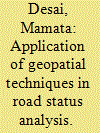

|
|
|
| 3 |
ID:
089768
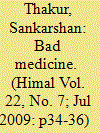

|
|
|
|
|
| Publication |
2009.
|
| Summary/Abstract |
Naxalism is, undeniably, a law-and -order problem, but it is not that alone; the violence Naxalites often wreak is a virulent symptom, not the disease itself. And untill the government realises that, its remedies are doomed to failure. The state government's 22 June ban on the Naxalites following the outbreak in Bengal is a mere updating-the-books exercise, nothing more. Maoist groups had long been banned; it is only that the government had not taken cognisance of their merger into one group.
|
|
|
|
|
|
|
|
|
|
|
|
|
|
|
|
| 4 |
ID:
093324
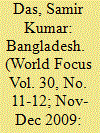

|
|
|
| 5 |
ID:
155427
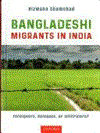

|
|
|
|
|
| Publication |
New Delhi, Oxford University Press, 2017.
|
| Description |
xiv, 317p.hbk
|
| Standard Number |
9780199476411
|
|
|
|
|
|
|
|
|
|
|
|
Copies: C:1/I:0,R:0,Q:0
Circulation
| Accession# | Call# | Current Location | Status | Policy | Location |
| 059207 | 305.8914126/SHA 059207 | Main | On Shelf | General | |
|
|
|
|
| 6 |
ID:
152996
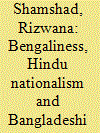

|
|
|
|
|
| Summary/Abstract |
Abstract
Hindu nationalists made migration from Bangladesh an election campaign in West Bengal during the 1990s. Although there were various allegations against Bangladeshi migration, it never became a mainstream political issue in the state, like in neighbouring Assam. West Bengal shares the longest border with Bangladesh, compared to any other Indian state, and hosts a large number of Bangladeshi migrants, according to the Census reports in India. West Bengal and Bangladesh share a common ethnicity, both are predominantly Bengali. Can this shared Bengaliness explain why Bangladeshi migration did not become a divisive political issue in the state? If this sameness is a bonding factor, what about the Ghoti-Bangal differences? Drawn from in-depth interviews with the representatives of West Bengal’s key civil society organisations and political parties, I argue that a particular historical and cultural process, unique to West Bengal and Bangladesh, has shaped the current attitude towards Bangladeshi migrants in the state.
|
|
|
|
|
|
|
|
|
|
|
|
|
|
|
|
| 7 |
ID:
113098
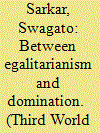

|
|
|
|
|
| Publication |
2012.
|
| Summary/Abstract |
This article presents the problem of governing differences as a problem of constituting a social whole out of the play of antagonistic elements like class, caste, gender, religion, etc, which is essentially a modernist political project in its normative grounding. The problem is explored here vis-à-vis the trajectories of global capitalism and the options for development (that is, the transition from an agrarian economy to an industrial one) for the smaller federal states. The experience of the Left Front Government in West Bengal, India is analysed to understand the issues at stake. The narrative presented in the article shows that questions of land ownership and freedom from oppression and bodily toil remain the fundamental political problem which determines the course and dynamics of governance of differences, particularly its egalitarian mode. This problemat also points towards the limits of agrarian modernity, which many post-colonial countries have tried to constitute.
|
|
|
|
|
|
|
|
|
|
|
|
|
|
|
|
| 8 |
ID:
177941
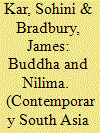

|
|
|
|
|
| Summary/Abstract |
This article explores the lives and careers of two people from left-leaning, political families in Kolkata. Their formative years and political horizons were shaped by the Left Front government in West Bengal (1977–2011), and they now negotiate the aftermath of the communists’ defeat in 2011 in their day-to-day lives. Buddha was born in Bangladesh, and is now a grassroots leader of the Communist Party of India (Marxist) in suburban Kolkata. His story encapsulates the struggle of building a political career in the aftermath of electoral defeat, mixing the pragmatism of being an important organizer or ‘party man’ with his commitment to cultural politics. Nilima is a young woman from a Leftist family employed by a microfinance institution (MFI). Her upbringing around the party and imbued with communist ideological values now conflicts with a thoroughly neoliberal workplace. Their experiences both in terms of their activism as well as their day-to-day experiences of work in Kolkata’s neighbourhoods offers insights into the contemporary political moment in the city after communism.
|
|
|
|
|
|
|
|
|
|
|
|
|
|
|
|
| 9 |
ID:
171225


|
|
|
|
|
| Summary/Abstract |
The end of dominant party rule is a fraught moment for political-bureaucratic relations in developing countries, with critical implications for public service delivery. This article examines political change in the state of West Bengal in eastern India, where a coalition of left-wing parties was deposed from power in 2011 by a populist opposition after 34 years of uninterrupted rule. The “change” party in West Bengal has not only avoided bureaucratic instability, public officials were successfully mobilized to increase the flow of public services. I argue that this anomaly can be explained by incorporating two variables whose effects have been under-theorized in existing research – the nature of the political mandate against the erstwhile dominant party and the organizational structures of the alternation party. More specifically, I argue that the electoral disintegration of the Left and the populist orientation of the new ruling party were crucial in producing a framework for cooperative political-bureaucratic relations. In the long run, however, as the frequently insufficient quality of these services indicate, only a programmatic mode of party politics can deliver lasting citizen satisfaction.
|
|
|
|
|
|
|
|
|
|
|
|
|
|
|
|
| 10 |
ID:
193287
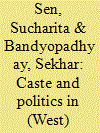

|
|
|
|
|
| Summary/Abstract |
Although many commentators believed that caste did not matter in West Bengal, in recent years it has emerged as a significant factor in electoral politics. The decline of the Left and the rise of the centrist-incumbent have fanned identity politics and the resurgence of caste-based political mobilisation. In this conversation, Sekhar Bandyopadhyay, a well-known expert in the history and politics of caste in Bengal, illuminates the complexities, uniqueness and dynamics of caste politics in colonial Bengal and contemporary West Bengal. The interview explores the evolution of the caste-system in colonial Bengal, its differences with the rest of India and the multiple manifestations of caste-based politics in contemporary West Bengal. Bandyopadhyay reflects on the intersection of caste with other categories of class and religion, the lower-castes’ involvement, appropriation and neglect in the political spectrum, and the future of caste and politics in West Bengal.
|
|
|
|
|
|
|
|
|
|
|
|
|
|
|
|
| 11 |
ID:
115051
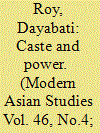

|
|
|
|
|
| Publication |
2012.
|
| Summary/Abstract |
This paper explores the institution of caste and its operation in a micro-level village setting of West Bengal, an Indian state, where state politics at grass roots level is vibrant with functioning local self-government and entrenched political parties. This ethnographic study reveals that caste relations and caste identities have overarching dimensions in the day-to-day politics of the study villages. Though caste almost ceases to operate in relation to strict religious strictures, under economic compulsion the division of labour largely coincides with caste division. In the cultural-ideological field, the concept of caste-hierarchy seems to continue as an influencing factor, even in the operation of leftist politics.
|
|
|
|
|
|
|
|
|
|
|
|
|
|
|
|
| 12 |
ID:
180052
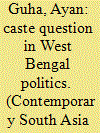

|
|
|
|
|
| Summary/Abstract |
The electoral decline of the organised Left in West Bengal politics has given rise to intellectual speculation about the increasing possibility of caste politics. In this context, this article investigates whether there is any merit in the claim that the electoral decline of the Left Front has paved the way for the rise of caste at the centre stage of mainstream electoral politics in West Bengal. It asks whether lower castes have started to mobilise politically in West Bengal in the same way as in many other states. The article argues against the claim of ‘a new politics of caste’ in West Bengal by showing that the electoral decline of the Left Front has not been accompanied by any rise in lower caste representation. In this context, the article also attempts to understand the reasons for the continuing non-politicisation of caste in West Bengal, revealing many factors relating to demography and political economy which don’t augur well for caste politics in West Bengal.
|
|
|
|
|
|
|
|
|
|
|
|
|
|
|
|
| 13 |
ID:
126664
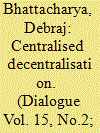

|
|
|
| 14 |
ID:
161117
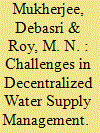

|
|
|
|
|
| Summary/Abstract |
The quick study in West Bengal indicates lot of institutional issues in decentralized management of water supply. GOI has been promoting demand driven PWSs for which Swajal guidelines have been issued recently. However, the country has a huge stock of PWSSs which have been established in a supply driven mode and now the responsibility of running those schemes are being handed over to the GPs.
|
|
|
|
|
|
|
|
|
|
|
|
|
|
|
|
| 15 |
ID:
188751
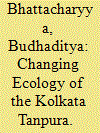

|
|
|
|
|
| Summary/Abstract |
The tanpura, a long-necked, unfretted, stringed lute, is arguably one of the most important instruments used by Hindustani classical vocalists. This ethnographic study draws from the lived experiences of luthiers and farmers specialising in crafting tanpuras. Auto-ethnographic reflections as a vocalist of this tradition also feed into this piece. Studying the effects of various phenomena, including evolving agricultural and climatic conditions in gourd fields and increasing scarcity of raw materials, the article underlines how it affects the sonic and visual profile of the instrument, thereby gradually transforming Hindustani classical sound at a very fundamental level.
|
|
|
|
|
|
|
|
|
|
|
|
|
|
|
|
| 16 |
ID:
126659
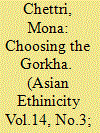

|
|
|
|
|
| Publication |
2013.
|
| Summary/Abstract |
The Darjeeling hills in northern West Bengal, India are being demanded as a homeland for the Gorkha community living in India. While the origin of Darjeeling is steeped in the imperial legacy of the British Raj, the Gorkha, a colonial construct is ironically used as a means to challenge the contemporary political regression and neo-colonisation of Darjeeling. Although the Gorkha identity is deemed as representative of the Nepali community residing in India, it acquires special meaning and importance in the Darjeeling hills, where majority of the people suffer low wages, unemployment, underdevelopment and poverty. In spite of a large working force in the tea estates, economic underdevelopment and political disempowerment is voiced through the assertion of ethnic rather than a class-based identity. Through an examination of the interaction between class and ethnicity, the Gorkha identity will highlight the malleability of ethnicity to extend itself to any situation and the emergence of an ethnic identity from class relations and grievances.
|
|
|
|
|
|
|
|
|
|
|
|
|
|
|
|
| 17 |
ID:
180700


|
|
|
|
|
| Summary/Abstract |
Circular labour migration from rural areas has emerged as a key feature of the Indian economy. Generally seen as a positive development, because of its impact of remittances on the household economy of the migrants, circular migration has also been associated with exploitation and unfreedom of the migrant labour. This paper focuses on labour out-migration to the construction sector from one of the economically backward districts of West Bengal, India. Firstly, it examines who participates in this migration process and highlights the nature of such migration. Secondly, it explores the outcomes of labour migration focusing on both the economic as well as the social dimensions. Thirdly, these outcomes are linked with the broader debates on the migration–development linkages. This paper argues that rather than focusing on the short-term and static gains of out-migration, there is a need to investigate the long-term, life-cycle implications of such circular labour migration.
|
|
|
|
|
|
|
|
|
|
|
|
|
|
|
|
| 18 |
ID:
103577
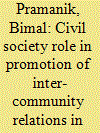

|
|
|
| 19 |
ID:
114013
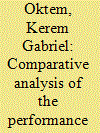

|
|
|
|
|
| Publication |
2012.
|
| Summary/Abstract |
This article compares the fortunes of the government coalitions under the leadership of the Communist Party of India (Marxist) or CPI(M) in Kerala, West Bengal and Tripura. The pattern of development and the success of the coalitions differ. In Kerala, the Left has lost every other election, whereas in West Bengal and Tripura, it has won many consecutive elections. West Bengal has seen stagnation in terms of human development, whereas Kerala and Tripura turned-to different degrees-into model states for human development. It is argued that the reasons for these different paths are to be found in the different strategies followed by the regional party units. Developmental success has been delivered through a mobilisation-based approach which has been followed inKerala and Tripura, but given up in West Bengal. This study explores thethree cases and elaborates on the reasons for the choice of strategies in the three states.
|
|
|
|
|
|
|
|
|
|
|
|
|
|
|
|
| 20 |
ID:
107422
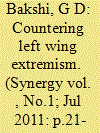

|
|
|
|
|
|
|
|